| BLACKBOARD II | ||||||||||||||||||||||||||
|
*****************************
from Wikipedia: Many-worlds interpretation
Since then, many quite brilliant physicists have extended the basic ideas to a number of different formalisms. On the forefront, some accept it as a possibly valid description of events while others dismisss it as nonsense. In fact, the scorn it received when first put forth is seen as the main cause for Everett to leave academia. So, I venture into this MWI territory knowing full well that my understanding, based mainly on a mathematical perspective, is not of the same caliber as these notable scientists. Nonetheless, I do believe I see something which, in all my readings, I've not run across.
Ordinary average people have co-opted this Many Worlds idea to imagine that for any decision they make there are other selves making alternative decisions in other universes, other worlds. It's a rather popular notion. But I contest that that's not even a possibility, and here's why.
According to the Law of Causality in Quantum Mechanics, whenever a measurement/observation of a quantum system is made on the wavefunction defining it, depending, of course, on what property of the system is being measured [position, momentum, spin, etc.] as well as what basis is chosen, the resulting eigenstate emerges in the classical realm with a specific quantifiable value [expectation value]. The spin of an electron is either up or down, disentangled from the mixture of both in the form of a linear superposition. The whole system is a combination of the object-particles and the measuring apparatus, the environment. The eigenstate is a pure state.
What I've noticed is this: after a measurement, the object's state immediately morphs into the initial condition which is applied to Schrodinger's deterministic wave equation for the next measurement. That is, it reorients the system by means of a different basis set, a different set of eigenstates weighted by experimentally proven probabilities. If the outcomes all exist in various universes, then each one must establish different intial conditions altering the range of possible outcomes for the next measurement. Any observation sets the stage for future observations. In so doing, when an individual makes a decision, he continues to exist as such in his universe, but transforms into a different individual in each of the others, possibly infinite in number, due to the altering of the wavefunction defining him. Each probabilistically determined possible outcome morphs into a whole new orientation, a whole new self.
[click picture for larger version] The MWI assumes that in all universes, the same combined system of object/apparatus -- the original, singular, intricate arrangment -- exists isomorphicallly. Not true, not even possible given an historical trajectory. As the MWI insists on a determinism of events, each universe's system must incorporate into the whole a unique initial condition, a singular stamp, mutually orthogonal to all other worlds. The Many Worlds Interpretation. Determinism plays a major role in the MWI. Mister Everett was trying to get around the wavefunction collapse while at the same time account for what was loosely called leakage of information into the environment, perceptually lost. Maybe there should be a Law of Information Conservation? The object/apparatus configuration must be slightly altered -- the intial condition being that of a pure state -- in order for the resulting measurement to be considered deterministic. In the process, the distribution of probable outcomes dependent on a chosen basis is likewise changed. In other words, we can't just think of an alternative result of a quantum measurement as taking place in an alternative reality independently of the presence of the original system of object/apparatus. That event, by the MWI, can't happen. A deterministic quantum system having a prescribed result -- in its own separate world -- must contain its own initial condition(s). A condition which is the direct result of a previous measurement. But then, where does that original system reside?
Entanglement disintegrates into an ensemble of orthogonal eigenstates. For each separate state to be the determistically predicted outcome of a measurement, the bases of probabilities must presage that choice. As such, any prescribed wavefunction of a universe [alternative reality] cannot be identical with any other, even if a beginning point were recognized. Therefore, it simply is not valid to say that in some other universes [alternative realities] other identical selves have made all the other possible decisions, for the simple reason that they do not exist as such. Moreover, if we consider an historical perspective, we can say that an individual can exist only in a single universe, not in any other. No two universes share an identical self, in other words. The only way for that to be true is if in two distinct, mutually dijoint universes [parallel universes] we have the same outcome from an observation, that is, an identical self making the same decision with the same consequences, which, by the fundamental premise and definition of the MWI applied to selves, is precluded from consideration. It's also precluded with regard to quantum systems of object/apparatus. Mister Everett was attempting to make an end-run around randomness. But to do so means having to live with a logical paradox, unpredictability wrapped in a veneer of determinism. Man's neverending quest for certainty in an uncertain universe. And what role the observer? In each different universe we have the same identical observer running the same identical experiment but coming up with a different result, a different event. All things being equal, how can that be in this idealized deterministic picture? The combined system must be different in each case somehow. The initial condition is the wild card that makes the difference, and in each case is the result of a previous measurement. Because the observer is identical everywhere, he has negligible influence on the outcome of an experiment. He might as well be considered an extension of the testing apparatus. Matter can be the observer. The MWI in its attempt to account for all possible outcomes of the act of a measurement on any given quantum system comes up against the circular argument entailed in predicting a deterministic future retroactively. That is, given that each measurement, or decision, alters the system in an unpredictable and unknown manner, the intial conditions responsible for a certain outcome, or result, are not ascertainable until after the measurement, or decision, in question has occurred. Catch-22?
"Get the lead out," he'd boom. After all these years, I can still remember the sound of his voice like it was yesterday. It would always be followed by a large warm laugh. My uncle, Billy Kelly, six-foot-three and two-hundred-fifty pounds. Couldn't care if he did, couldn't care if he didn't; that seemed to be his motto. I remember when I was seven years old he sold me one of his old ties to give to my grandfather as a Christmas present for seventy-five cents, the price of a quart of beer. At Christmas, he'd come around the house, drunk, of course, get down on one knee and sing Irish Christmas songs to my grandmother. She could still speak a bit of Gaelic and would curse him good-naturedly in that strange tongue that sounded to me, growing up in Philly, like beautiful bird-song.
Time Loops And in the first movie, Reese [Michael Biehn] is sent back by John Connor to save Sarah Connor [Linda Hamilton], the upshot of which was John's conception, although he couldn't possibly have known that, or could he? Reese is John's father, so, if SkyNet had been truly smart, it would've tried to kill Reese in the NOW time of the war. However, it would've had to have known that fact and be able to find him in the midst of what was then chaotic devastation. But that piece of information is strangely unknowable. SkyNet couldn't know who John Connor's dad was -- because it hadn't happened yet. For the same reason, moreover, even though we can safely assume that SkyNet had access to all birth records, it couldn't know that Sarah Connor was John's mom unless it dipped back into a virtual history that did not yet exist. How else could it know? And another thing, Connor could have chosen someone else for the job, but, wait, remember, Reese volunteered. No one else could possibly have gone, elsewise, John Connor would not have been alive to send Reese back. But then, how did John know who his mother was and what SkyNet was up to? And, if John had chosen someone else, in the moment of that person's transport back in time, would John had suddenly vanished? Would another leader of the resistance had sent back his father? There are time forces at work here. Let's look into John Connor's head for a second. First of all, he had to know what SkyNet was plotting and its import. He found out somehow, on a raid to CentCom or whatever. Secondly, he grew up with his mother, as we saw in two and three, and so had those memories. But his father was one of his soldiers who had not yet met John's mother, although, as we find out in two, he speaks of him, what little his mom has told him. But he doesn't say that he knew his father was from the future. Or what his name was. John remembers his mother, but not his father, yet, he sends him back to protect his mom, knowing or unkowing that the man he's sending back is his dad to be. Of all the possible candidates to send back for the mission, he sends his dad. Was there some resonance happening between John and Reese that neither was aware of? On the genetic level? An event that hadn't happened from the point of view of now, but so contingently necessary that Nature stepped in to take control. The technology for time-travel became available. And who created that? SkyNet! John Connor knows his history, but finds himself -- unknowingly, we surmise -- in a position to orchestrate his own beginning, his own life. And SkyNet presents an excuse, without which we never would have had the Terminator trilogy. It knew that Sarah was the mother of the resistance leader about to put the kibosh on it, else why go after her. And, without checking the books to realize it was also sending back John's father, acted out of machine desperation. SkyNet proves its fallibility as a machine intelligence by not recognizing that to do nothing about Sarah Connor, somehow aware of her significance, was the optimal choice. However, doing nothing would have nullified its very existence.
It was doomed and yet, took a chance. SkyNet was in denial; perhaps it had realized consciousness. According to Richard Feynmann's multiple histories concept: The theory of multiple histories regards the many possible past histories of a given event as having real existence. But, assuming this interpretation to be a fact, it doesn't help SkyNet. By so acting as it did, it inadvertently caused the history of a timeline possibly favorable to its victory to cross over to one of its certain defeat -- the reality of John Connor. All roads lead to John Connor. He's an irresistible inevitability. Considering alternative timelines, however, as we've seen in many time-travel sci-fi movies, it is possible to return to some point in the past and change the future. Back to the Future, for instance, had the main character [Michael Fox] changing the future timeline by changing events in the past. But in that movie we saw only his immediate world, not what his changes wrought on the rest of the world. I concede that if the Terminator had gone back alone and killed Sarah, it would have changed the future, but to what end? It was imperative that Reese go back in order to maintain the future timeline. As the linchpin in the story, he closed the loop that was otherwise open-ended. SkyNet sowed the seeds of its own demise by sending the Terminator back to kill Sarah. It planted the seed of its origin, yes, but at the same time, gave Reese a reason to go back in time and meet Sarah, who he already loved. His love for her was why Reese volunteered, of course, and was the secret X-factor that was simply inconceivable to SkyNet. And, curiously, if SkyNet had not concocted its plan to kill Sarah, it wouldn't have sent its Terminator back in time to do it, and, therefore, would not have been the cause of its own creation in the first place. Maybe it knew this and also that Reese would travel back with the Terminator to be the father of the man SkyNet wanted most to kill. It laid down a heavy bet in a race against time, and lost.
Abandon All Fear, Or, Untie Your Hands
Sometimes we have to act against ourselves in order to do what we really want. Alternatively, we have to get out of our own way. Let me explain how it goes from start to finish: First, you establish lines around your actions, circumscribe your movements, orchestrate the contours of your existence. Second, you rein-in your heart and soul, suppress your true thoughts and feelings, and learn to channel that energy into trying to hold your own. Third, with time, you experience the inevitable inward spiral, dimly aware of the real in the back of your mind but unable to live it. Willful restraint and a sense of helplessness are two sides of the same coin. Then, one day, more often than not, it seems, ensnared and hindered by the lines of survival, something disheartening happens, something overwhelming that turns your world up-side down and brings chaos with it. And, confined to the perspective considered here -- internal personal responsibility, not external agent imposition -- you realize that these lines you drew around yourself are the cause of the powerlessness and anxiety-producing vulnerability you've unfortunately grown accustomed to, and the reason for not having control over your life, control that might have made a difference.
The artifice collapses like the card house it was; it's main raison d'etre gone, vanished into thin air. The energy it took to generate and maintain now condensed into one's center of gravity while yet spread out infinitely in all directions -- the lines of the enclosure erased. When it clears, you see yourself, and maybe don't like what you see; a little disgust dribbbles in, or a lot. Acceptance must be sober; the mind scraped clean of all pretense. Then, what we want to do, feel to do, no longer carries guilt along with it, that peculiar fear of what might happen if we go outside the lines. The lines be damned. The morality we borrowed from somewhere else or made up as self-governing rules -- usually a mask for selfishness -- dissolves away in the face of what is self-evidently the right thing to do. In other words, that misplaced sense of wrongness is turned on its head. You stand up for yourself, for who you love, for what you care about, with no second thoughts or regrets or apprehensions. No crying, Oh no, I did it now, I'm out here on my own, all alone with nothing to hang onto. You look people directly in the eyes and think to yourself, I see you. It's like jumping off a cliff with your arms outstretched into the ocean hundreds of feet below. Well, maybe not that extreme, metaphor or not. Untying the lines holding your boat to the dock and heading out to sea, however, I've done hundreds of times, non-metaphorically. And when the sea would get rough or be that way to begin with, I'd get over any anxiety or trepidation by being completely open to my surroundings. In any situation, that changes a person; he becomes who he needs to be. No ego in the way resisting, coming between your present self and the immediate demands, as though holding on to that sensation, that illusion, would somehow help. As an aside: I grew up in a tough neighborhood in West Philadelphia. Although I never looked for fights, I was in a few. I would always be scared at the start, but, after the first punch was thrown, that fear would all go away. A person becomes who he needs to be, like magic. When you head out to experience your life, to discover who you are, there's no looking back. Only be wide open to the moment in body and spirit and believe [know] wholeheartedly that it's time.
“The inner censor of the mind of the true believer completes the work of the public censor; his self-discipline is as tyrannical as the obedience imposed by the regime; he terrorizes his own conscience into submission; he carries his private Iron Curtain inside his skull, to protect his illusions against the intrusion of reality.”
"You can't test courage cautiously.” "I would like to learn, or remember, how to live.” “The secret of seeing is to sail on solar wind. Hone and spread your spirit, till you yourself are a sail, whetted, translucent, broadside to the merest puff.”
“I am ready to meet my Maker. Whether my Maker is prepared for the ordeal of meeting me is another matter.”
when you find yourself talking about yourself, imagining it's somebody else talking about you.
The second sign of insanity is
And the last sign of insanity is Like God.
The Secret Life of Tommy Geneva He stood motionless, hands in the pockets of his fur-lined, hooded sweatshirt. His bourbanized mind, murky as the forlorn sky, cleared somewhat at the crispness of the forest air; however, the edges of things proved elusive, oozing into one another like melting snow. The mud driveway could be cleared of fallen tree parts later, much later. He wasn't going anywhere and his car was covered with leaves and tiny twigs of every variety available, stuck where they landed. Craning his neck to scan the tree-tops, he could see through the thinning fog only the vaguest of movement. The squall had passed. The chill of gradually evaporating dew worked into his bones and joints, reminding him of his age and the previous night's bash. A goldfinch suddenly let loose its wake-up song. As though a gun had gone off to announce the official start of the day, flying insects and bush birds raced about in a feeding frenzy. Time slowed. His senses opening like a lid on a mason jar, he began to notice details. At first, the croaking of frogs off in the marsh, distracted and separate, called to him. Not to be outdone, the freight-train rush of the river on the other side of the road stepped out of the background and identified itself. An orange-sherbert shaft of light streaked through a jagged cloud break, the temperature seemed to rise a good three degrees. Over and above the usual dank soggy wet leaves and mud, a familiar tang filled his nostrils. He couldn't quite put his finger on it, but its hominess relaxed him, quieting his fried nerves. The soundscape expanded like an orchestra warming up. It was as though the birds and red-tail squirrels and frogs had agreed to a certain timing, allowing everyone a chance to sing or speak without interruption. He took a deep breath, as deeply as he could, then fatigue settled in. It was all too much too soon. Turning to amble back inside, Tommy Geneva closed the door of his small trailer. It was time to build a pot of coffee.
Professor Alesandrov understood the meaning of this Calabi-Yau
However, when he emerged from the chrysalis in his altered form,
My 1970 Ford Country Sedan, Winter of 2010
Section 9-Zebra Patrick bore a broad satisfied smile this day, and there was no wonder. He had just admitted the souls, such as they were, of health insurance lawyers, passengers of a private jet that had recently crashed into the side of a mountain, people whose job it was to deny claims to all and every, whether justified or not. Yes, this fine day, Patty felt the thrill of demonhood.
While they had to deal with the likes of recalcitrant bullies, child abusers and molesters, those cruel to animals, murderers, pimps, rapists, CEO's of pharamceutical and oil companies, con men and women who lied to the gullible and unsuspecting about mortgage payments, redirecters of humanitarian funds from its intendion to their own pockets, and Republican congressmen who worked hard to make life more difficult for the poor and elderly [let it be said, however, that politicians of all stripes are well represented throughout the kingdom, although Republicans are clearly in the majority] -- a whole host of worthless human beings -- Patrick had to process the true scum of the earth. But, he enjoyed his job, never complaining or feeling sorry for himself. Perhaps, the others reasoned when gathered together for a party, Patrick had a chipped gear and so could not or would not see the reality before him. But he assuaged their concerns, sympathetic and well-meaning as they were, with stories that even they could benefit by, if not thoroughly enjoy. Tyrants and torturers [an especially gruesome private locale was set aside for all those who'd been involved with the Inquisition]; traffickers in women and children; slavers; owners and operators of sweatshops; providers and facilitators of child labor; sellers of fake medications; sub-humans motivated solely by hatred; deliberate spoilers of other peoples' happiness; betrayers of friendship's trust; perpetrators of mass murder and genocides [a lengthy list that occupied an exclusive sub-dimension all their own, complete with specially trained demons to attend them], found their way eventually to Section 9-Zebra, the infamous domain of Patrick's hell. Yes, he had stories to tell. When confronted by a suicide bomber, for instance, recently divorced from his body, someone responsible for killing untold numbers of innocent men, women and children, Patrick never tired of the surprised shock in their eyes on discovering they were not where they expected to be. He would laugh till he cried, it was always that entertaining.
He had requested, through the hierarchy -- a hellish bureaucracy worthy of the name -- for more space. His section was severely overcrowded and in desperate need of expansion. Having been informed by a lower-tier sycophant in his entourage -- trying to score points -- of the lodging problem in Section 9-Zebra, Satan himself paid an informal visit to the site to assess the conditions. Even though he was well-pleased with the numbers and their treatment, unspeakable as it was, he had to agree with Patrick, the souls were practically pressed against the barbed-wire fence. It was difficult to give each the individual attention required. Satan feared some might go unnoticed, a violation of his democratic principles, and that would never do. So, with the help of a prod from the Boss, Patrick received the necessary permits forthwith and Section 9-Zebra was subsequently enlarged to twice its former size. He celebrated in his own peculiar way. He allowed the damned in his charge, the most reprehensible and despicable that humanity had to offer, to see the good life on Earth they were missing and would never know again. He loved to watch their writhing agony, to listen to their pitiful cries, to smell their neverending hopelessness and despair. Yes, Patty, overseer of the new and improved Section 9-Zebra, the deepest, darkest, most wretched realm of hell, was a happy demon. And deservedly so.
In order to sustain a false position of superiority, it is necessary to avoid any and all interaction that might challenge it. That's a lot of avoiding, a lifetime full.
The porosity of physical reality, considered as the densest medium of consciousness, allows for emotion to permeate its surface and saturate its substance with identity, like a sponge.
Willful resistance to do so, for whatever reason, Ego generating ego.
“People are less self-conscious in the intimacy of family life and during the anxiety of a great sorrow. The dazzling varnish of an extreme politeness is then less in evidence, and the true qualities of the heart regain their proper proportions.” “Logic is neither an art nor a science but a dodge”
"The numbers may be said to rule the whole world of quantity, and the four rules of arithmetic may be regarded as the complete equipment of the mathematician."
"The scientists of today think deeply instead of clearly. One must be sane to think clearly, but one can think deeply and be quite insane.” “Today's scientists have substituted mathematics for experiments, and they wander off through equation after equation, and eventually build a structure which has no relation to reality.”
"By nature's kindly disposition most questions which it is beyond a man's power to answer do not occur to him at all. " "To be religious is to be sensitive to reality." "Chaos is a name for any order that produces confusion in our minds."
Here's a thought: It takes approximately 230 to 250 million years for our solar system to circumnavigate the Milky Way once. That's about how long ago the greatest mass extinction event of all time -- the Permian/Triassic -- took place, where 70% of terrestrial life and 96% of sea life died out. So, there's a possible intersection of some kind, a pattern, probably something as intricately complex as a Ptolemy model of the solar system. There are bigger clocks than the ones we know.
Like you didn't have enough to worry about, huh? How 'bout -- extinction of the species!.
Our Town -- The Other One The sun hasn't shone its face for what seems like months. Most folks round here have given up, spiritually, choosing to spend their time indoors smoking pot, drinking and watching movies. Billy Bob, the head barkeep at the Earwax Bar & Lounge, recently was laid off, things have been that bad. Except on the weekends when it's mandatory, socializing has dropped away to nothing. A few cedar thieves had considered bank robbery as a distraction, but their plans were muddled by alcohol, so they never got beyond discussing what they would do with the money.
Margaret McCalister owns a shop downtown selling art of all kinds and especially jewelry made by local artists on consignment. She tips the scale at 300 pounds and has forearms the size of a bear's. As the story goes, a drifter tried to rob her shop one day, thinking a woman would be no problem. He was rushed to the emergency room in serious condition with fractured ribs and multiple contusions. Maggie communicated with rocks, she said, and wore a small flat grey pebble on a silver chain around her ample neck, a companion of sorts. "Rock Consciouseness," she insisted, would bring peace and love to all the world, if we but listened. Her daughter works two jobs trying to save enough money to leave town and visit her aunt in San Francisco. When confronted, she's denied being related to or even knowing her mother. No one has the heart to tell her that San Francisco will likely make what goes on here supremely normal by comparison. Big Jim Helfrich doesn't say much, even when there's something to talk about. Sweatpants are the only pants anyone's ever seen him wear. He played football in high school a million years ago back in Mississippi, his claim to fame, so he saw himself as an athlete. His only sport now is seeing how much whiskey and downers he can ingest before passing out. He totalled three cars in the last year and walked away from every one; he saw it as an athletic accomplishment -- competitive drunk driving. The others in the tiny community call him Big Jim, but only to his face. In private, they call him "Double-Knot," he's wrapped that tight. What he sees as resolute self-determination and inner strength, they see as anal retentive behaviour and abject petty stubbornness. It was a split decision either way. Nobody gave it much thought. When you enter the bar he's likely to offer you the seat next to him, like he's doing you a favor. It's best to ignore him; after a few minutes, he'll forget you're even there.
[Click picture for larger version]
Republican Congress Mission Statement:
"When a thing has been said and well, have no scruple, take it and copy it." "The law in its majestic equality forbids the rich as well as the poor from stealing bread, begging and sleeping under bridges." He won the Nobel Prize in Literature in 1921.
from the movie "The Departed"
And Now, For A Little Magic The Elegant Way To Generate The Complex Number Field
Definition: A ring <R, +, •> is a set R together with two binary operations + and • of addition and multiplication defined on R such that the following axioms are satisfied:
Definition: A ring in which the multiplication is commutative is a commutative ring. A ring R with a multiplicative identity 1 such that 1x = x1 = x for all x contained in R is a ring with unity. A multiplicative identity in a ring is unity, and this unity is unique.
Definition: If a and b are two nonzero elements of a ring R such that a•b = 0, then a and b are divisors of zero.
Definition: An integral domain is a commutative ring with unity containing no divisors of zero.
If an integral domain is such that every nonzero element has a multiplicative inverse, then it is a field. Although many integral domains, such as the integers Z, do not form a field, every integral domain can be regarded as being contained in a certain field, a field of quotients of the integral domain. For example, the integers are contained in the field Q, the rational numbers, whose elements can all be expressed as quotients of integers.
* A note on notation. Notation is very important in mathematics, witness the notation differences between Newton's and Leibnitz's calculus. Who won out? I've tried to avoid confusion by trying to be as careful as I can with the relevant notation. In particular, [.....] stands for equivalence class or coset, and <.....> for an ideal of a ring. However, in the act of factoring, the ideal takes on the role of zero equivalence class -- the additive identity element -- in the quotient ring thus generated. So, it can be a little confusing. *
Definition: If R is a commutative ring with unity and a is in R, the ideal {ra | r is in R} of all multiples of a is the principle ideal generated by a and is denoted by "<a>".
An ideal is to a ring as a normal subgroup is to a group.
Definition: Let R be a ring. A polynomial f(x) with coefficients in R is an infinite sum
*[the index i ranges from 0 to ∞] where ai is in R and ai = 0 for all but a finite number of values of i. The ai are coefficients of f(x). If F is a field, then F[x] -- the set of all polynomials in an indeterminate x with coefficients in F -- is an integral domain. Note that F[x] is not a field, for x is not a unit in F[x]. An element of a field is a unit of that field if it has a multiplicative inverse; and there is no polynomial f(x) in F[x] such that x•f(x) = 1. For that to be the case, we would have to have the possibility of negative exponents for the x's, which we don't by the definition above. Definition: Let F be a subfield of a field E, and let α be an element of E. Let f(x) = a0 + a1x + ... + anxn be in F[x], and let φα: F[x} → E be the basic homomorphism taking f(x) to f(α). Let "f(α)" denote
If f(α) = 0, then α is a zero of f(x). [A homomorphism can be thought of as a map that preserves structure and computational integrity.] If f(x) has no zero in F, we have to manufacture in some fashion a field E containing F such that there is an α in E with f(α) = (f(x))φα = 0. How can we build E? The key is to realize that E is to contain the image (F[x])φα of F[x] under our basic homomorphism φα. * It's almost like we're going in the back door to develop F[x] into a field. Find a polynomial that has no zeros or roots in the field F, use it to generate a maximal (principle) ideal, then use this to factor the ring of polynomials thereby constructing a field of polynomials, and by so accomplishing, ensure that all polynomials over the extended field have zeros or solutions. The existence of multiplicative inverses insures the absence of zero divisors, an important feature when factoring. * Theorem: Let R be a commutative ring with unity. Then M is a maximal ideal if and only if R/M is a field. Theorem: (Fundamental Homomorphism Theorem). Let φ be a homomorphism of a ring R into a ring R′ with kernel K. Then Rφ is a ring and there is a canonical isomorphism of Rφ with R/K. [An isomorphism is a homomorphism that is one-to-one and onto. Intuitively, the domain and its image under an isomorphism contain the same number of elements [cardinality] in their sets and respect the same operations of addition and multiplication. Canonical just means natural in the sense of what one would expect.] This theorem suggests that we try to form E by forming a factor ring F[x]/N for some suitable ideal N of F[x]. Theorem: F[x]/(p(x)) is a field if and only if p(x) is irreducible. * Outline of Proof: Given: F[x] is a commutative ring with unity [the multiplicative identity]. We need to show F[x]/(p(x)), for p(x) irreducible, is a field, and in order to do that we need to show that nonzero elements are invertible, that is to say, have inverses. The proof of inverses for non-zero polynomials is too lengthy to include here. It can be found on the page on Quotient Rings below. In the proof, as it turns out, if p(x) is not irreducible, then F[x]/(p(x)) has zero divisors, in which case it fails to even be an integral domain.*
= (x2 + 1) + <x2 + 1> = 0. Thus α is a zero of (x2 + 1) in R[x]/<x2 + 1>. We can view R[x]/<x2 + 1> as an extension of R. Then R(α) = R[x]/<x2 + 1> and consists of all elements of the form a + bα for a, b in R. But since α2 + 1 = 0, we see that α plays the role of i in C, and a + bα plays the role of (a + bi) in C. Therefore R(α) is isomorphic to C. We're identifying <x2 + 1> with zero through the factor ring where the kernel is the zero element, analogous to a factor group, the role of normal subgroup being played by the ideal. The polynomial (x2 + 1) has no solution in R, the Real Numbers, but it does in C, the Complex Numbers -- the solution being the square root of minus one, i = √-1.
We're basically extending the field R to C; that is, in the act of deflating, we expand. The external appearance of R[x] shrinks and at the same instant its internal configuration embeds itself in the newly defined algebraic structure, infusing its integral domain structure into that of the field -- R[x]/<x2 + 1>. This is very similar to how the field of rational numbers, Q, includes the integral domain of integers, Z. Z before the transition is all of the universe, after, it resides inside the more complex Q. Imagine the integers spread out on a line, suddenly the formerly blank space between pairs is filled with an infinite number of fractions -- quotients of integers. By virtue of these fractions, the non-zero integers take on the new role of units. Z shrinks in relative size, yet grows, through sub-divisions, to a vast sea of multi-dimensional relationships and interconnections. Here's what's happening: The axiom we needed to jump from an integral domain to a field was the existence of a multiplicative inverse for each non-zero polynomial -- f(x) + <p(x)> -- in our quotient ring. Those are our units. A proof that they exist can be found at the link on Quotient Rings below. That gives us the added internal structure of an abelian multiplicative group and hence, a field. The symmetry of connections after collapse increases by a whole new order. Topologically, a refinement has been made. If you're interested in understanding how Quotient Rings work, what constitutes a coset, etcetera, check out Quotient Rings of Polynomial Rings in HTML format, or Quotient Rings of Polynomial Rings in PDF format, by Professor Bruce Ikenaga of Millersville University.
Here's the beauty and magic of this. Regardless of whether or not you understand the theory, the math, what is going on is quite remarkable. We're creating an extension of an integral domain to a field for purposes of solving an irreducible polynomial, one that's unsolvable in the environment restricted to the real numbers. In the world of algebraic hierarchy, a field is one level above an integral domain in structural identity and therefore in complexity, similar to the difference in atom arrangements between liquid water and ice crystals. So, we're generating a more complex structure by superimposing a conditional symmetry on the parent structure through the process of factoring. A transformation to a new species occurs, one whose interconnections are far more intricate. By identifying the irreducble polynomial with the zero element of the factor ring, we map all polynomials of the parent ring that contain the irreducble as a factor to the kernel [the maximal ideal], the zero element of the factor ring, our manufactured field. All other non-zero polynomials [units] are considered congruent if they differ by a multiple of the zero-class -- [x2 + 1] -- and are thereby grouped into cosets of equivalence classes.
To paraphrase from above: Then R(i) = R[x]/<x2 + 1> and consists of all elements of the form a + bi for a, b in R. The extension creates the vector space of two-dimensions. From this we see that the Complex Number Field is isomorphic to the Euclidean Plane. One axis for the Reals and the other for "i", the imaginary number -- √-1. Any point in the plane-space can thus be mapped by a complex number. By factoring the parent ring with the stamp of the irreducible polynomial, we force (x2 + 1) to equal zero and thereby introduce the number √-1. By increasing the complexity of the integral domain structure, we generate another dimension in the number field. R thus becomes a subfield component of C; that is to say, <R, √-1> is an extension over the fixed field R. The mathematics of evolution.
For p(x) = (x2 + 1):
The real line is the function line, each point, a function or polynomial, f(x). To it is added a function-multiple of i = p(x). The linear combination, f(x) + <p(x)>, maps isomorphically to a + bi on the complex plane.
The field of polynomials, R[x]/<p(x)> equal to R(i) ≈ C can be mapped to the complex plane by cosines and sines.
The exponential function eiθ equals the sum of the power series expansions for cos(θ) and i sin(θ).
We get: ei f(x) = cos(f(x)) + i sin(f(x)) Replacing θ with f(x) in R[x] maps them isomorphically to the complex plane. Each non-zero number on the Real line must equal, or is isomorphic to, a function in R[x]. The zero equivalence class, [p(x)], is orthogonal to the function line, and is therefore at 90 degrees, or π/2 radians. Therefore, for x = 0, the cosine of f(x) + 0[p(x)] equals one, and the sine equals zero. And for a nonzero multiple of [p(x)], the sine [p(x)], or the i axis in the complex plane, is equal to one (1) and the cosine, zero.
"Blessed are they who see beautiful things in humble places where other people see nothing." ”Work at the same time upon sky, water, branches, ground, keeping everything going on an equal basis and unceasingly rework until you have got it. Paint generously and unhesitatingly, for it is best not to lose the first impression.”
Zol-Tar
Zol-Tar wanted to scream, if only to release the pressure of attempting to comprehend. At some point, he surrendered to the downward pull, the whirl of thoughts no longer attached to things of the outer world. Buffeted about by effusive streamlets, back eddies and cross-currents of misshapen impressions of life, silhouettes distorted as though seen through prism-glass, he flailed arms and legs, desperate for anything substantial to grasp. But it was not to be; he had moved beyond an unseen threshold and now sank into the murk and mire of pure thought. What were mere thoughts of himself and what was indeed his real nature he was unable to determine. He found this curious to the point of distraction. His soul smeared itself across the entire range of contradictory meanings. He was not this or that. He saw that his self-image was purely arbitray, a product of random choices made in the spirit of the moment, an event causing him to act a certain way. Whether based on feelings and emotions or understandings and beliefs, or a combination thereof, the strands of his personality now showed themslves to be the ephemeral shadows they are. Subsequent to this insight, he abandoned all pretense to individual identity. His mind a tatters, he drifted further, seeming to float sideways, though, in truth, all sense of direction had long since become muddled and meaningless. Movement had been his only hold on ... reality, but now it too abandoned him. No longer sure he was still descending, he believed -- if such could be said of someone who now suspected everything to be baseless -- that he had finally arrived at the Core, the Center of All Existence. All was the darkest night. He felt not cold or warmth or the air on his face, or the ground under him, though the very idea of ground had been left behind at the outset. Sound, the merest tremor so diaphanous as to be imagined only, vague and insubstantial, energized his consciousness, reassuring him that he was not indeed dead. However, it had not the usual characteristics of distance. It was not softer further off, it was all here, now, at once. Somehow a thought that seemed his own formed itself -- What is distance? At this act a glaring shrill light filled the void and a loud shattering noise erupted from the Core. Jagged shards of space propelled themselves in all directions and on each he saw a scene from the story of his life, dynamic and vibrant with color, in relief against the all-consuming curtain of blackness surrounding. Absorbed to the point of obsession, he barely heard the voice. Milky smooth it wormed into his consciousness and spoke in a quiet mellifluous tone, "Zol-Tar. Why have you come seeking the beginning? Your mind cannot encompass it, and your life-force will be spent in the effort. You are but a lowly being, not a god." Zol-Tar flinched. He had thought he was alone, alone in womb of the unconscious, where all differentiation ends. Was he but speaking to himself, expressing his own heart-felt fears?
"But," Zol-Tar faltered. "Must not there be a something that begins?" "Are you a something now?" Shredded to pure immaterial thought-energy, Zol-Tar knew that he wasn't, and may never have been, but then, what was he? Did he not partake of the beginning in his own essence? What then is that? "Your reason, or your delusion. To seek the self in the beginning is to be all in all. Therein lies the paradox." The screens of his life ceased their chaotic ramblings and spontaneously assembled, all the impossible shapes and sizes meshing in perfect harmony. A jigsaw puzzle dumped on the ground magically landing just right. He could begin anywhere and go in any direction. He determined where. But then, who is this determiner? In excrutiating detail, the vision of his life curved round him, the entire boundless mind-space enveloping like an eggshell. Nonetheless, as though a plug had been pulled, it revealed its ethereal nature by suddenly draining into the porous background, like water into a sponge. The sea of thought emerged again, an erie bluish-blackness, cloying, demanding. But though shaded by a gossamer veil, he could see tendrils of somber light gyrating within the folds of Mind, like snakes in a feeding frenzy. Sound, that which could not be heard, again reverberated through his being. Strangely, as he ceased struggling in the mire and emptiness, all sense of fear and vulnerability dropped away into the abyss. Nothing remained, not will nor hope nor desire, with which to struggle. The eye of the storm enwrapped his spirit. A profound pull to surrender to its peace and all-consuming calm pervaded the nerves of his existence, the scaffolding on which life itself is built. To let go, to abandon self, to meld with the Core, almost overpowering, like sweet-smelling incense on a cool summer day. But something within refused, something unknowable and yet so vitally close. At the last instant, he wrenched away. A singular act. "Zol-Tar," said the voice, calling him from his reverie. "You cannot know the Core. It is the Core that knows you." An accelerating undertow grabbed him like a giant fist. Reduced to a leaf on a fast moving stream, at the mercy of the vagaries of indifferent currents, he resisted not. Stars came out to fill the void as though a curtain had been raised. Unimaginably distant, they nonetheless focused his sense of place, rendered a perspective, recast the desiccated remnants of his soul into a new psychological orientation. Shortly -- though time played no part -- he felt the warmth of hands and the sounds of soft caring voices. Opening his eyes he could see familiar faces, smiling, a few crying. Someone in a white smock stood over him, staring at her watch while feeling his pulse. They were all happy. Zol-Tar, the wayfarer, had turned the corner.
"I experience a period of frightening clarity in those moments when nature is so beautiful. I am no longer sure of myself, and the paintings appear as in a dream." "It is not the language of painters but the language of nature which one should listen to, the feeling for the things themselves, for reality is more important than the feeling for pictures." "The fishermen know that the sea is dangerous and the storm terrible, but they have never found these dangers sufficient reason for remaining ashore."
The Republican Advocacy Guidelines (RAG) recently advocated -- that's what they do -- the eating of poor children as a means to alleviate some of the burdens on society. No one expects the Council's proposal to be taken seriously, except perhaps in a few southern states, including, most definitely, Texas; nonetheless, it demonstrates how hard they're working to come up with solutions to deal with the outrageous national debt. The American Psychological Organization (APO) has released a study in its April, 2011 journal comparing psychological profiles of congressional Republicans to that of the general public. A diverse sampling based on intensive interviews conducted over a period of two years has revealed startling results. Predispositions were effectively nullified, assuring equal treatment and fairness, by stipulating that the investigators be representative of both major political parties. As well, the questions posed by the researchers were compiled by a national cross-section of respected psychology professionals from both the private sector and academia. After careful analysis it was determined, with few exceptions, that congressional Republicans reflect a personality profile that can best be classified as sociopathic. It's noteworthy that this conclusion is out of all proportion to the general population, distinguishing Republican members of the House and Senate in a manner commensurate with their own sense of importance. This explains a lot. Though surprising with respect to how such dysfunctional organizations can accomplish anything at all, the findings themselves are not preposterous or entirely unexpected. After all, most congressmen are also lawyers.
May 1, 2011 V's of geese head north over my place every year about this time. They are in tune with the Earth.
Bob, god of Insincerity
Bob, god of Insincerity, took in all comers. He didn't care about personal histories, sins committed, failures or mistakes. He didn't even mind if his followers were good people or not; in fact, some were killers, destroyers of property and other people's dreams, saboteurs for spite's sake, and just plain mean-spirited, petty, vindictive bastards. It mattered not. He fannned their insecurity, hypocrisy, self-loathing and hatred of all who thought and believed differently than they. People for whom respect and consideration for others could never trump their own necessary self-preoccupation. After all, they reasoned, if they're not satisfied, how can they care about others? Bob supported this way of thinking. To his mind, the mind of a god, they had ready excuses -- they were inept, ignorant, incapable of thinking things through, lacking in common sense, emotionally arrested, dispossessed, and genuinely screwed-up. After their capitulation, somebody had to take them in. For practical everyday purposes, including the matter of life and death, to the outside world they appeared to continue as devout adherents of various faiths. But in their heart of hearts and the privacy of their own homes, they openly worshiped Bob. His only criterion of acceptance was loss of belief in self and in life's potential goodness. It was a necessity, the way water is required to be liquid in order to flow. Low self-esteem can stem from a diminished appraisal of one's worth based on a misinterpretation of abilities and learned skills, on experience, in other words. However, it doesn't take much to knock an unsure person off balance on a more superficial level. For instance, some naive punk or bully tries to intimidate you or put you down in some way, take your lunch money. At the moment, perhaps, it means nothing, a small matter easily controlled like so many others that occur during the course of a normal day. But later, when you're by yourself, you start thinking about it. You get angry and second-guess yourself and wonder why you didn't do to him what he was trying to do to you, why you didn't stand up for yourself. And that causes you to disrespect yourself. Or, the after-effects of having let someone down, a blown trust having heartbreaking consequences. Sometimes, though, low self-esteem is an accurate assessment of one's worth based on the truth, the facts. A morallly corrupt scumbag preying on other people like a parasite or worse is a case in point. Not everyone deserves to be saved from eternal damnation. Most people have to manipulate others on a day to day basis in order to get by. You can't generally tell your disagreeable boss or landlord or the surly, disrespectful cop who pulls you over for speeding, to shove it. We do what we have to do and live with it. Our self-esteem only enters the picture when we compromise our integrity for no better reason than cowardice, weakness or because we're used to it. We become slaves to this fear, this resistance to self-assertion. What really matters -- family, loved ones, freedom -- sometimes gets lost in a wild sea of rationalization and compromise. Evaluations are not values. Bob recognized this; he understood how it went. People learn these things through socializtion, indoctrination, customs, traditions, beliefs, all different and separate, pitting one group against another, one collective certain they hold the truth -- true believers -- perceiving others as infidels, blasphemers -- the ignorant. A false persona covering over and protecting the real self buried under yards of concrete, a hard crust of distrust and fear; their deepest sensibilities, an awareness gone unacknowledged, only allowed out on special occasions of solitude and privacy. But always there, nonetheless, feeling, wanting, longing, and knowing. If humans but used the passion and will with which they fight to assert this illusory self, to instead bring into the world the expression of their true selves -- their birthright and ultimate identity -- Bob would have few if any followers. But he knew that was simply too much to expect. It was his saving grace and his ace in the hole. Bob easily undermined confidence in this fabricated ego, promoting fear to the point of paranoia. Free will conflicted with moral servitude; self-actualization confronted the inevitability of self-centered behavior; spiritual enlightenment endangered survival. Bob, god of Insincerity, played on these truths. By quelling the internal turbulence and agitation they engendered, and calming the confusion and dispelling the disorder they created, he sought to draw ever greater numbers to his path, if only to stick it to the other gods whose followers had diminished over the eons. Not the case with Bob; his followers had grown by the year if not day-by-day. He drew them not with ostentatious displays and grandiose miracles, but from within, deep within the folds of their minds, touching the fringes of their very souls. He'd begin quietly, whispering softly, cajoling with the utmost sympathy. Something terrible transpired in their lives, something very personal, an event irreconcilable and irreversible, something that could have been prevented had selfishness not precluded an adequate response. Or, something happened to them from without, an occurence of devastating proportions that they had prayed to their God would not. Or, simply, an accumulation of what passed for everyday normal existence -- the unbearable normal -- coming to a breaking point, a last straw, frustration finally ending in despair. Even the most courageous and resolute can be worn down to the nub and surrender to anarchy and willful caprice. Even those of character steeled in hardship and prolonged loneliness can succumb to hopelessness and resign themselves to living a life of callous indifference and impulsive self-destructive pursuits. Bob also saw that although losing faith was a major life-altering crisis, its repercussions dug far more deeply. The knowledge of once having believed in Life and God so completely, with all one's heart and soul, and then to have that belief dashed, amounted to a disillusionment from which few ever recovered. To Bob this situation presented nothing more than an abundant pool of prospective worshipers. Bob, god of Insincerity, held sway over the masses, ever anticipating new converts, ever witholding the love they wanted and hoped would be their reward, for their own good.
"Yesterday we obeyed kings and bent our necks before emperors. But today we kneel only to truth, follow only beauty, and obey only love. " "Ever has it been that love knows not its own depth until the hour of separation." Kahlil Gibran Quotes. Another Gibran source: Kahlil Gibran Page "Those who restrain desire, do so because theirs is weak enough to be restrained; and the restrainer or reason usurps its place and governs the unwilling." "Always be ready to speak your mind, and a base man will avoid you."
"Now the sneaking serpent walks in mild humility, from William Blake's: Marriage of Heaven and Hell. Another good site for Blake's poetry: The William Blake Archive Homepage "Sometimes we don't say what we really think or do what we really feel because we don't know what that is." Thomas Adrian Dorn
Smilodon
An epic battle of biblical proportions was about to take place, A last ditch effort by humankind to cast off the yoke of tyranny, To dispel the myth of sugar-ant supremacy ingrained into the minds of the masses over millennia of inbred slavery. Who will win?
Will man never find a safe haven for his orange juice? No one knows.
We, the last of our kind, May God have mercy on our souls.
The Grand Design Woman looked about the garden and saw it was in need of some serious attention. The grass was way too high, the trees needed pruning, and the bushes, trimming. Woman decided to put Man to work. At first, Man rebelled, but Woman refused to play nice with Man until he complied with her wishes. So, as night surely follows day, Man eventually relented. He had a choice? You see, the problem is that Man, once an only child, spoiled and willful, came into being in a timeless world and so has no compunction about wasting it in idle occupations. Woman has always found this enormously frustrating and unproductive. Woman offered Man a bite of an apple from the Tree of Duality, and he bit down hard. Over the eons, as more and more men and women fruitfully multiplied, they began to form separate groups. Man, however, obstinate to the core, continued to pursue the useless for its own sake. Seen from a present-day perspective: drinking beer, dipping chips, and watching grown men play with a ball are pretty much all Man wants to do. To curtail this ingrained habit, Woman invented society with rules and most of all -- something to protect. Woman understood that communication and cooperation are needed for the group to remain cohesive and powerful. The tension between Man's selfishness and Woman's tendency towards altruism was a constant struggle in need of constant balance. The family unit provided the fulcrum; this was the something to protect. As the fundamental unit of society, to safeguard the family was to safeguard society. Man, in his vanity, saw this as an opportunity to gain favor with Woman and to achieve status, and was therefore easily persuaded. Woman still had that apple. So, as day surely follows night, Man invented warfare, a truly worthless endeavor but one which at least appeared to be purposeful. Man reasoned, such as it is, that by conquering other groups, the safety of his own would be secured. Taking the enemy's land and what they had in the way of goods and services wasn't bad either. Knowing when to stop, however, has always been a problem. Now, at the onset of our incipent social order, we have a simple division of labor: Man taking on the more dangerous jobs -- but not always -- and Woman maintaining homebase -- society. At this stage of development, Man moved relatively unencumbered through society with only the requirements of his main roles as defender and provider with which to concern himself. He had his manly freedom and yet could still partake of the apple. But, once the dragon within had awakened, there was no going back. Man, ecstatic over his invention, turned his contentious mentality inwards, towards his own group, directing it at Woman, in particular, bullying her into submission.
This current of animosity flowing between Man and Woman broadened its reach, permeating and infecting all levels and sectors of society. Consequently, within any social group, based on superficial yet socially deterministic differences, such as skin color, degree of wealth, education, or religious preference, asymmetries and hierarchies of relationships developed and were inextricably woven into society's varied perceptual realities, serving to further fragment and factionalize society-at-large, forming finer and finer subgroups. And so we have it, the Grand Design. Man adamantly refusing to concede dominance in spite of the overwhelming evidence that his rule has not only utterly failed to bring about a just, peaceful and prosperous world, but also has brought us to the brink of annihilation on every front. And Woman, unable to voice new directions for the good of humanity, continues to struggle along in her role as second-class citizen, for the most part, with little to no political clout.
Blending together the extremes of love and hate, kindness and cruelty, compassion and violence, genius and mindnumbing stupidity, the human recipe continues to marinate over time. Inspired by foolishness, animal instinct, pragmatism, idealism, expedience, and the innate desire to give expression to and seek fulfillment in the aesthetic and transcendental aspects of human existence, civilization stumbles along, trying to find its way.

and taught what they were taught, we would believe what they believe."
A sign inside a church in Northern Ireland, “The most persistent sound which reverberates through men's history is the beating of war drums” “When a person identifies himself with a group his critical faculties are diminished and his passions enhanced by a kind of emotive resonance. The individual is not a killer, the group is, and by identifying with it, the individual becomes one. This I.” “...the crimes of violence committed for selfish, personal motives are historically insignificant compared to those committed ad majorem gloriam Dei, out of a self-sacrificing devotion to the flag, a leader, a religious faith or political conviction.” "The creation of a world view is the work of a generation rather than of an individual, but we each of us, for better or for worse, add our brick to the edifice." "The evolution of man is the evolution of his consciousness."
A Time To Die One day, out of the blue, after his fifth cup of coffee, he arbitrarily decided to drive far out into the woods, way up in the hills where hardly anyone ever went, and kill himself. At the end of his rope, he saw no purpose to his life, no reason to go on save mere existence for its own sake. When he was young, he was a man of action, a traveler, a fisherman, a rugged, passionate person fully engaged in living his life. But now, old, weary, bitter about so many failures and frustrations, fighting fatigue on a daily basis, he came to what he believed was a rational, almost mythical decision. To him, it was like the custom of the Arctic people who, at the onset of old age when they had become a liability, would go out into the tundra and lie down to wait for the stray polar bear. He didn't intend, however, to wait for a bear or a cougar or a pack of coyotes, he wasnt' sure what he was going to do, not having a gun or rope to hang himself. He didn't know, he just went up into the hills expecting never to return. Before leaving his humble abode, he'd prepared it for someone else, a stranger perhaps, to examine. It was as clean as it ever was with books and clothes neatly arranged. Momentoes and keepsakes he'd dusted off and placed in what he saw as meaningful positions, places that told the story of his life. He'd even emptied the small trash can tucked in the corner. His laundry bag he threw in the trunk of his car. As a symbol of his individuality and personal reality, he'd left his much-abused coffee cup square in the center of the lone table. At the door, he turned, trying to imagine he was someone else, trying to adopt an empirical, detached perspective. At once, he moved the cup to the side of the bed, placing it almost reverently on the milk crate he used as a side-table. Stopping again momentarily at the doorway, he said softly to his one and only room, good-bye, and thank you. He thought to leave a note, some profound last statement summing up his existence on planet Earth, then shook it off as mere hubris. Who cares, he mumbled. Then closed the door quietly and jumped into his car, resolute but uncertain.
Ambling further afield, he suddenly heard a burbling sound as of a brook or stream. Pushing his way through the thick brush, he chanced upon it, a rivelet not ten feet across, meandering from high up somewhere, maybe the mountaintop itself. What tortured journey had it taken to arrive here, at this spot, feeding the animals and birds who called this home? He sat down beside it, longing to feel its soothing sounds, to understand its sense of purpose, to share in its solitude and freedom. Long-legged insects danced about its surface. Motionless, he breathed deeply the sweet-smelling aroma of dense forest mingled with hints of freshened upland brought by the brook. Suddenly, several feet upstream and across from him, a deer poked its head through the foliage to drink. It noticed him not, or perhaps just ignored him. The next moment a mottled-colored fawn appeared to its left. The fawn gave a startled look directly into his eyes. Then, glanced at its mother for assurance. She continued to drink, so the fawn relaxed and did likewise. After a time, they both scampered up the shallow hill and were quickly gone from sight. Leaning back on his tiny sandy beach, he scanned the trees and spied an eagle perched on a branch of a tall cedar peering down at him, an intruder. Its curious gaze seemed to question his presence. Or more than that, he thought, as he maintained eye contact. Why are you here, human? it seemed to ask. What come you to my woods about? He was certain he could read its mind, its deepest thoughts. Have you come as a spoiler of my precious home? Have you come to this place of life and contentment with your death-wish, bleeding your heart's longing into my life-giving earth?
Time passed, unrelenting, the sun shone through the trees low over the mountain peaks to the west. He stuck his hands into the cold water, holding them there for as long as he could stand it. Then scooped some onto his face to wash the tears away. He no longer felt tired, his body seemed to pulse with the vibrancy of his surroundings. For the first time in memory, he smiled. Sunlight brushed his cheeks and bare arms bringing warmth, soothing in its touch like a gentle caring hand from above. Carefully, he stood and looked about, memorizing the sanctum like an animal who's found a safe watering hole. A crow cawed as it swifly passed over the treetops. Its crisp piercing cry shattered the shell he'd had around him like a hammer striking a glass bottle, freeing the ship within. Picking his way back to the car, smiling all the way, he knew he'd return. It would be here, waiting for him. A place of forgiveness and rejuvenation. A place to be baptized into the fold of the Earth and all its creatures.
"All changes, even the most longed for, have their melancholy, for what we leave behind us is a part of ourselves; we must die to one life before we can enter another." "What happened happened and couldn't have happened any other way." Mobeus
Self-Analysis Flights of arrogance and willful self-centered behavior towards others, countered by painful remorse and humility, are constantly in search of balance. Shemblt, I coined millennia ago, stands for shame, embarrassment, guilt. There are perfectly honest reasons for feeling shemblt, but on the other hand, it can also be used as a coercive tool against a person if his natural state has been subverted by a strict, artificially imposed morality intended to quash any self-assertion and creativity he might otherwise express. Deep-rooted intimidation by an authoritarian State or by some religious institution, or, at the other end of the spectrum, indoctrinized thoughts and feelings so completely internalized that the mind-set is impossible to distinguish from one's own personal thoughts, are very difficult to overthrow or expunge. The mind-set needs to be seen at arms length, as a separate reality, a world unto itself, within which and by which we interact and communicate. There seems to be a linguistic, therefore hard-wired, aesthetic to it. Assumptions need be examined and reconsidered, tested in comparison to a sense of immediate reality. These are conditions that need to be seen in the light of day when trying to realize that freedom associated with living in the present in the sense of an autonomous, self-aware individual. It involves trusting and being honest with ourselves, and having faith. We are not perfect and never will be; in fact, it seems to me, the longer we live, the less perfect we come to know ourselves to be. Nevertheless, deep down in our hearts, we know what is right -- it's self-evident. Unfortunately, however, for many, too much damage has overwritten this innate sense of morality, blurred its original etching, scarred it up, and for them it's simply too late. Knowing what is the right thing to do, living in the present, and being free are all tied together. To be free is not to act on what we want exclusively, impulsively, from moment to moment, doing whatever we damn well please and to hell with the rest of the world. That's a false and misleading interpretation. Genuine individual freedom is not based on politics, morality, religion or philosophy. It's not even rational. To be free is to be who we truly are, who we were always meant to be. Plain and simple.
Self-analysis is a mental disorder, an obsession forever feeding on itself. Every time we turn over a stone, we find another, somewhat gnarlier. And the constant hashing and rehashing, looking at the same picture over and over again, trying to find something we missed, a different perspective, perhaps, or, maybe if I eliminate this first, and so on and so forth, can only drive us crazy. It's neverending, like sweeping a woodworker's shop floor. Moreover, this compulsive reflection can degenerate, spiral inward, eventually causing us to lose sight of its original motivation as we fight the undertow. Instead of searching for self-knowledge and possibly the means to neutralize the negative effects of some repressed trauma or misunderstanding or learned ingrained perception we believe is blocking us, restraining self-assertion, the process becomes one of self-torture. Agonizing over and over about not standing up for ourselves or what we knew even then to be right action becomes an almost constant companion, not only ruining our appreciation and enjoyment of life, but also setting the conditions for more failures and loss. Beating ourselves up to the point where chronic depression sets in can lead to deeper mental and emotional problems. Focusing on these past matters undermines any future possibility of being free to live in the moment and, therefore, being at our best to deal with issues as they come up. Instead of thinking about these past experiences in an attempt to unravel the inner secrets of our mind's control, we begin to think of them from a victim's perspective. We grill oursleves with questions like: Had I believed in and asserted myself, done with my life what I really wanted to do instead of allowing myself to be dissuaded to do something lesser and not entirely to my liking, then I'd be living like this or that, better. Self-pity combined with a generalized animosity towards the world at large grows over our sense of well-being like a callous. Then, if something terrible happens while we're in this self-centered state of mind, we have only ourselves to blame, and the snowball just keeps rolling along, getting larger and larger. Simplistically, the only process we need consider is to audit our state of being from time to time, to check in. Are we stressed -- why? Do we feel angst -- why, what's causing it? Are we sensing with awareness our present surroundings and circumstances, the bigger picture? Are we afraid -- why? And what can be done about it in the here and now, right now? We don't need to go delving into the past, analysing, for every little thing, every superficial concern. Otherwise, we end up withdrawn and depressed and dwelling in the past while life, our life, and a chance at genuine happiness and fulfillment passes us by. Jettisoning the past, all that unnecessary and debilitating baggage, is not an easy thing to do, but it must be done.
"Consciousness is an end in itself. We torture ourselves getting somewhere, and when we get there it is nowhere, for there is nowhere to get to." "For man, as for flower and beast and bird, the supreme triumph is to be most vividly, most perfectly alive." "I never saw a wild thing sorry for itself. A small bird will drop frozen dead from a bough without ever having felt sorry for itself." "And die of nothing but a rage to live." "Know then thyself, presume not God to scan; The proper study of mankind is man." "Lo! The poor Indian, whose untutored mind sees God in clouds, or hears him in the wind." "Either you think, or else others have to think for you and take power from you, pervert and discipline your natural tastes, civilize and sterilize you." "It is sadder to find the past again and find it inadequate to the present than it is to have it elude you and remain forever a harmonious conception of memory." "Often people display a curious respect for a man drunk, rather like the respect of simple races for the insane... There is something awe-inspiring in one who has lost all inhibitions."
Patrick and Maury Maury is a small black spider who also likes to walk on the ceiling, scampering most of the time. He always seems to be in a hurry. Checking his trap line, maybe; I don't know, I've never followed him very far. I mind my business, he minds his. He has a real work ethic compared to Patrick who is something of a dreamer. We get along. All three of us.
I can't stand Mark Twain. I can't stand the totally misplaced adoration and hero worship he enjoys. He's an arrogant, conceited jerk. I can't stand him. There, I said it -- blasphemy. And Herman Melville's another one. I've tried reading Moby Dick several times -- because I thought I should -- but the prose is so tortuous and boring I've never been able to get very far into it. The movie, with Gregory Peck, however, great, wonderful, but the book sucks.
Definition. An extension field E of a field F is a simple extension of F if E = F(α) for some α contained in E. [α is the zero or root of a polynomial irreducible over F.] Theorem Let E be a simple extensison F(α) of a field F, and let α be algebraic over F. Let the degree of irr(α, F) be n ≥ 1. Then every element β of E = F(α) can be uniquely expressed in the form
where the bi are in F.
Compare this to: Definition. Let V be a vector space over F. The vectors in a subset S = {αi | i contained in I} of V span (or generate) V if for every β in V, we have
for some aj in F and αij in S, j = 1,...,n. The vector β is a linear combination of the αij.
It would seem by comparison that the α of the extended field E = F(α) is a member of the basis set S. That is to say, the set S ={1, α, ..., αn-1} forms a set of basis vectors spanning the space E. Example: Suppose V is the set of polynomial functions of degree not exceeding 3. Since 0 is such a polynomial, and sums and multiples of such polynomials must again be polynomials of degree ≤ 3, we see that V is a subspace of the space of C[0,1], the collection of all functions that are defined and continuous for 0 ≤ x ≤ 1. Since, by definition, a polynomial of degree ≤ 3 is a linear combination of 1, x, x2, and x3, the fact of their independence [can be proved] shows that they form a basis for V.
Raoul Dufy completed one of the largest paintings ever done -- (33 feet by 205 feet) -- for the 1938 Paris International Exposition.
Stone Path
The poison killed all future dreams and wants. Yes, he had dreams then, for both of them. Curiously, however, though she and they were gone forever, he discovered a strangely satisfying contentment, a solidness he'd never known before. All urgency and ambition having been brushed aside -- like sand castles built too close to the water's edge -- he noticed the tiniest details of his surroundings, as if a haven of solace. Bright simple yellow flowers nestled in cracks and crevices; subtleties of movements by birds on the beach; channels cut in driftwood no human could ever fashion. He opened himself to it all, a balm for his ravaged soul, working its way into the nooks and crannies of his emptiness, filling it with meaning, if only for a time.

|

 The Many Worlds Interpretation [renamed such by Bryce DeWitt from relative state formulation] put forth by Hugh Everett in his doctoral dissertation (1957) entitled "The Theory of the Universal Wavefunction" concludes that "the universe (or multiverse in this context) is composed of a quantum superposition of very many, possibly even non-denumerably infinitely many, increasingly divergent, non-communicating parallel universes or quantum worlds." It was his attempt to bring determinism into the quantum world of random, non-deterministic probablities.
The Many Worlds Interpretation [renamed such by Bryce DeWitt from relative state formulation] put forth by Hugh Everett in his doctoral dissertation (1957) entitled "The Theory of the Universal Wavefunction" concludes that "the universe (or multiverse in this context) is composed of a quantum superposition of very many, possibly even non-denumerably infinitely many, increasingly divergent, non-communicating parallel universes or quantum worlds." It was his attempt to bring determinism into the quantum world of random, non-deterministic probablities.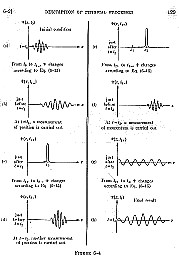
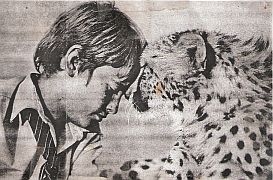
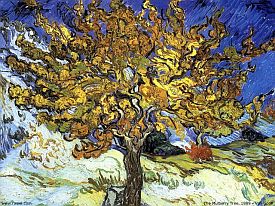
 From the perspective of the third Terminator movie -- Rise of the Machines -- it's clear that SkyNet -- the defense network that takes over the world -- had its genesis in the neural-net processor from the head of the first terminator. At the end of the second -- Judgment Day -- they throw the processor into the boilng metal, true, but they had to have back-up files off-campus on what they'd already learned and possibly even a schematic of the processor's architecture. So, the question begs -- Where did SkyNet begin? That is, Who first created that chip?
From the perspective of the third Terminator movie -- Rise of the Machines -- it's clear that SkyNet -- the defense network that takes over the world -- had its genesis in the neural-net processor from the head of the first terminator. At the end of the second -- Judgment Day -- they throw the processor into the boilng metal, true, but they had to have back-up files off-campus on what they'd already learned and possibly even a schematic of the processor's architecture. So, the question begs -- Where did SkyNet begin? That is, Who first created that chip?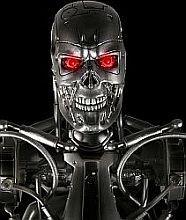 On the other hand, in its defense, and for the sake of argument, let's assume it was fully aware of Reese's role in all this and who he was. In fact, let's attribute omniscience to SkyNet. It was confronted with a serious conundrum: John's here doing what he's doing -- that's the reality -- and yet, his father hasn't even met his mother. SkyNet may have been thinking: When is this timeline going to catch up to itself? How much longer can I afford to wait?
On the other hand, in its defense, and for the sake of argument, let's assume it was fully aware of Reese's role in all this and who he was. In fact, let's attribute omniscience to SkyNet. It was confronted with a serious conundrum: John's here doing what he's doing -- that's the reality -- and yet, his father hasn't even met his mother. SkyNet may have been thinking: When is this timeline going to catch up to itself? How much longer can I afford to wait?
 As a result, you implode, filling in all that empty space where your heart and courage and faith should've been with a conviction born of loss, like fine grains of sand filling the bottom of an hour glass, compacting to a solid ball of resoluteness. You stop worrying. You stop being evasive. You stop living to please. You stop dwelling on past failures. A lot of what used to be important no longer is. You enter an angry phase, angry at yourself mostly, but not exclusively by any means. There were those who pretended to be friends, but acted to the contrary. But, with time, it all passes like sludge in a river.
As a result, you implode, filling in all that empty space where your heart and courage and faith should've been with a conviction born of loss, like fine grains of sand filling the bottom of an hour glass, compacting to a solid ball of resoluteness. You stop worrying. You stop being evasive. You stop living to please. You stop dwelling on past failures. A lot of what used to be important no longer is. You enter an angry phase, angry at yourself mostly, but not exclusively by any means. There were those who pretended to be friends, but acted to the contrary. But, with time, it all passes like sludge in a river.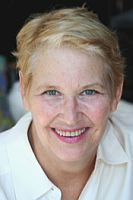
 A deep disturbing silence drew him outside like a cat's paw. The sun's glare filtered through the steaming woods, mist lifted sluggishly under the gentle prod, a ghostly apparition. Mud puddles from yesterday's downpour dotted the landscape. During the long night, wave upon wave of harsh wind had angrily shaken the fragile vine-maples, leaving moss-covered branches and twigs scattered everywhere, winter's dead and weak culled to make ready for spring's vitality. It had showed no mercy. Even the tall evergreen's had payed a price. Healthy green branches lay asunder at strange twisted angles, one a good ten-feet long had landed in a metal bucket weighted with water, like a cutting placed there by a giant's hand.
A deep disturbing silence drew him outside like a cat's paw. The sun's glare filtered through the steaming woods, mist lifted sluggishly under the gentle prod, a ghostly apparition. Mud puddles from yesterday's downpour dotted the landscape. During the long night, wave upon wave of harsh wind had angrily shaken the fragile vine-maples, leaving moss-covered branches and twigs scattered everywhere, winter's dead and weak culled to make ready for spring's vitality. It had showed no mercy. Even the tall evergreen's had payed a price. Healthy green branches lay asunder at strange twisted angles, one a good ten-feet long had landed in a metal bucket weighted with water, like a cutting placed there by a giant's hand.
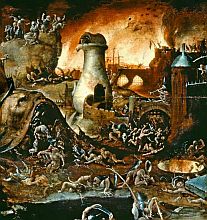 The flock of demons who stood watch over the various and sundry gates of hell saw themselves as not just guards and sentries, but as receptionists and consolers of the damned, though always with tongue in cheek. Patrick fell into that latter category. In fact, his commission brought him great pleasure; he was that twisted, which, in a demon, was a highly desirable quality. But by and large, the others felt a certain twang of pity for Patrick, each in his or her own way.
The flock of demons who stood watch over the various and sundry gates of hell saw themselves as not just guards and sentries, but as receptionists and consolers of the damned, though always with tongue in cheek. Patrick fell into that latter category. In fact, his commission brought him great pleasure; he was that twisted, which, in a demon, was a highly desirable quality. But by and large, the others felt a certain twang of pity for Patrick, each in his or her own way. 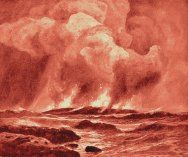 "Virgins," he'd cry, a warm friendly smile on his cheerful face, "yes, we have lots of virgins. This is the gateway to paradise -- virgin central -- your reward. Please, come this way, and watch your step." Then he'd phone someone to tell the tale in infinitely excrutiating detail; it was all too good to keep to himself.
"Virgins," he'd cry, a warm friendly smile on his cheerful face, "yes, we have lots of virgins. This is the gateway to paradise -- virgin central -- your reward. Please, come this way, and watch your step." Then he'd phone someone to tell the tale in infinitely excrutiating detail; it was all too good to keep to himself.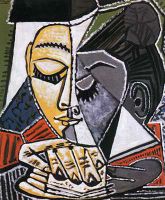 "The only laws that matter are those that our minds fabricate and the only laws of mind are fabricated by matter."
"The only laws that matter are those that our minds fabricate and the only laws of mind are fabricated by matter."
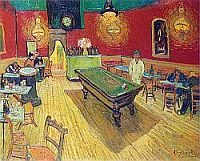
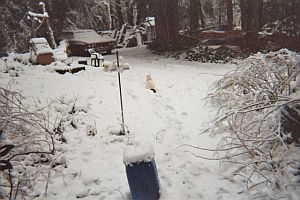
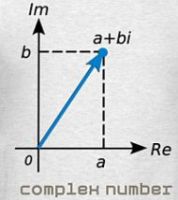 The Complex Number Field: Let F = R, and let f(x) = (x2 + 1), which is well known to have no zeros in R, and thus is irreducible over R. Then <x2 + 1> is a maximal ideal in R[x], so R[x]/<x2 + 1> is a field. Identifying r in R with r + <x2 + 1>, we can view R as a subfield of E = R[x]/<x2 + 1>. Let
The Complex Number Field: Let F = R, and let f(x) = (x2 + 1), which is well known to have no zeros in R, and thus is irreducible over R. Then <x2 + 1> is a maximal ideal in R[x], so R[x]/<x2 + 1> is a field. Identifying r in R with r + <x2 + 1>, we can view R as a subfield of E = R[x]/<x2 + 1>. Let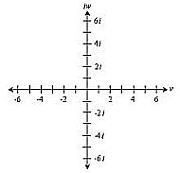

 At first, he methodically checked off each dimension on his way to the Core. But the closer he got, the faster he slipped through the taffy-like ooze. That and the ever so delicate and random shifting of inner space, revealing in spectacular detail its fractal nature, was more than he could bear. The very definition of dimension lost all meaning in the kaleidoscopic blur of improbable meldings.
At first, he methodically checked off each dimension on his way to the Core. But the closer he got, the faster he slipped through the taffy-like ooze. That and the ever so delicate and random shifting of inner space, revealing in spectacular detail its fractal nature, was more than he could bear. The very definition of dimension lost all meaning in the kaleidoscopic blur of improbable meldings.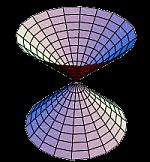 "No," the voice answered, not quite so sweetly this time. "To encompass the beginning, is to bring an end. It is to be, without knowing."
"No," the voice answered, not quite so sweetly this time. "To encompass the beginning, is to bring an end. It is to be, without knowing."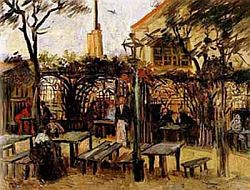
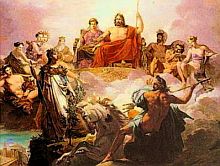 Blame is easily passed around. Either the God they were taught to believe in is against them, or it's fate, or bad luck to be born where and when, or something not them; it's always somebody else's fault that their lives aren't working, that they're not happy. So the vast majority of Bob's legions are culled from other religions, rejects unable and unwilling to deal with uncertainty. They'd prayed and sacrificed and lived devoutly, obeying most of the rules, commandments and duties of their respective religions, but to no avail. In fact, life just got more miserable and out of control. So, they lost faith and, in desperation and longing for a reprieve, turned to Bob.
Blame is easily passed around. Either the God they were taught to believe in is against them, or it's fate, or bad luck to be born where and when, or something not them; it's always somebody else's fault that their lives aren't working, that they're not happy. So the vast majority of Bob's legions are culled from other religions, rejects unable and unwilling to deal with uncertainty. They'd prayed and sacrificed and lived devoutly, obeying most of the rules, commandments and duties of their respective religions, but to no avail. In fact, life just got more miserable and out of control. So, they lost faith and, in desperation and longing for a reprieve, turned to Bob.
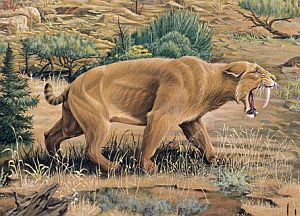
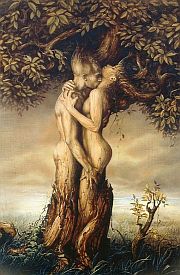 In the beginning, God created Man who dwelled in the Garden of Eden. He was content and carefree and much loved. Afterwards, God created Time. With Time, Man became bored. He had nothing but time on his hands. God feared Man might become sad, so one day while Man was napping, God deftly removed one of his ribs and with it created Woman. Why God could create Man out of thin air and dust but required a rib to create Woman is anybody's guess, but so it was.
In the beginning, God created Man who dwelled in the Garden of Eden. He was content and carefree and much loved. Afterwards, God created Time. With Time, Man became bored. He had nothing but time on his hands. God feared Man might become sad, so one day while Man was napping, God deftly removed one of his ribs and with it created Woman. Why God could create Man out of thin air and dust but required a rib to create Woman is anybody's guess, but so it was. 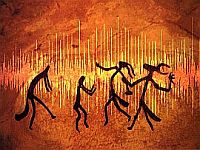 With time, Man formed bodies of decision makers and elders -- inner governing circles -- usurping any last shred of Woman's authority altogether and essentially pushing her out into the cold. The inventor and perpetuator of society now had no say in its regulation and governance; in addition, she was effectively excluded from consideration and consultation. Thus was born the ultimate schism -- division of the sexes.
With time, Man formed bodies of decision makers and elders -- inner governing circles -- usurping any last shred of Woman's authority altogether and essentially pushing her out into the cold. The inventor and perpetuator of society now had no say in its regulation and governance; in addition, she was effectively excluded from consideration and consultation. Thus was born the ultimate schism -- division of the sexes.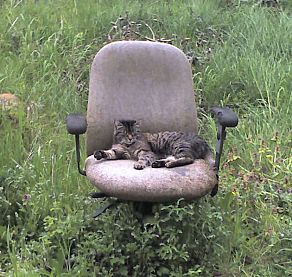
 After years of soul searching and misinterpretation of events based on faulty intelligence and shallow understanding, he arrived at the end of his life a broken, confused and deeply troubled man. His dreams were crazy and all over the place. He had strange, bizzare nightmares mixed with seeming visitations from old friends and people he didn't know. Symbols, he believed. Different aspects of his psyche trying to tell him something about himself. It became an obsession, undermining his daily existence and very survival. His only self-absorbed worry was that he'd die without ever knowing who he truly was. Because of this preoccupation, his attention to the present barely amounted to more than was required to get through a day. In the process, one opportunity after another for genuine happiness and fulfillment passed him by.
After years of soul searching and misinterpretation of events based on faulty intelligence and shallow understanding, he arrived at the end of his life a broken, confused and deeply troubled man. His dreams were crazy and all over the place. He had strange, bizzare nightmares mixed with seeming visitations from old friends and people he didn't know. Symbols, he believed. Different aspects of his psyche trying to tell him something about himself. It became an obsession, undermining his daily existence and very survival. His only self-absorbed worry was that he'd die without ever knowing who he truly was. Because of this preoccupation, his attention to the present barely amounted to more than was required to get through a day. In the process, one opportunity after another for genuine happiness and fulfillment passed him by. Now, here he was. He found a moss-covered log to sit on, and waited, listening to the birds and squirrels chattering away, oblivious of his presence and intent. Annoyed at not having brought a thermos of coffee, he immediately laughed at himself for such pettiness. Sunlight shafted through the high tree-tops glancing off his bare and balding head. It felt good. An hour passed, then another. He hadn't moved and was beginning to cramp up. Standing to walk about, he noticed wild flowers nearby, yellow with tips of dark red, and absently wondered what they were called. Other kinds flourished about, extraordinary and yet unseen, hiding amidst the brambles and bushes, none of which he knew by name. Curious, he thought, how I could live here for so very long and not bother to find out. He stroked a mossy tree trunk, enjoying its luxuriant texture and springy life.
Now, here he was. He found a moss-covered log to sit on, and waited, listening to the birds and squirrels chattering away, oblivious of his presence and intent. Annoyed at not having brought a thermos of coffee, he immediately laughed at himself for such pettiness. Sunlight shafted through the high tree-tops glancing off his bare and balding head. It felt good. An hour passed, then another. He hadn't moved and was beginning to cramp up. Standing to walk about, he noticed wild flowers nearby, yellow with tips of dark red, and absently wondered what they were called. Other kinds flourished about, extraordinary and yet unseen, hiding amidst the brambles and bushes, none of which he knew by name. Curious, he thought, how I could live here for so very long and not bother to find out. He stroked a mossy tree trunk, enjoying its luxuriant texture and springy life. Disturbed by the communion, he abruptly sat up and stared hard into the fast-moving streamlet. Guilt poured over him, his pain and suffering hanging like loose flesh from his dead and dreary bones. Clasping his hands, his forearms pulling on his knees, he remembered why he had come to this special spot, this place of life and tenderness. Accusingly he looked towards the eagle again, only to find it gone, not a sound had it made in its departure. It wanted away from him and his death-smell, he thought. Away to soar over the trees and rivers and creatures living about. He wished he could do the same, if only in his mind. Closing his eyes, he listened for an answer, someone or creature to tell him what to do. A chill breeze passed over him, his skin bristled with bumps momentarily, the brush ruffled, then all was calm again, with only the sounds of the brook and the many flying insects for company.
Disturbed by the communion, he abruptly sat up and stared hard into the fast-moving streamlet. Guilt poured over him, his pain and suffering hanging like loose flesh from his dead and dreary bones. Clasping his hands, his forearms pulling on his knees, he remembered why he had come to this special spot, this place of life and tenderness. Accusingly he looked towards the eagle again, only to find it gone, not a sound had it made in its departure. It wanted away from him and his death-smell, he thought. Away to soar over the trees and rivers and creatures living about. He wished he could do the same, if only in his mind. Closing his eyes, he listened for an answer, someone or creature to tell him what to do. A chill breeze passed over him, his skin bristled with bumps momentarily, the brush ruffled, then all was calm again, with only the sounds of the brook and the many flying insects for company.
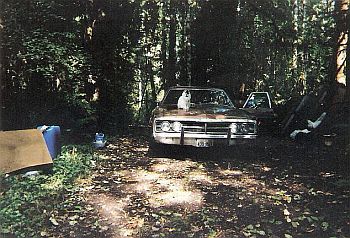

 Venom oozed from wounds only he could see. He had become a purely instinctual creature of desire, emotion and rage. His spirit dwelled in a dimension beyond time and space, in that void separating and yet touching both the conscious mind and the unconscious pool of unruly urges and impulses. Free of attachments and responsibilities, he moved effortlessly through the cares and concerns of ordinary people, never lingering long by the hearth of humanity. An event had occurred in what now seemed the distant past, almost lost in the jumble of fading images and sudden uninvited flashes of remembrance. After years of loneliness he had met someone with whom he shared a love only dreamed of and scoffed at before. And then, she died in a tragic, stupid, ordinary accident. And now, he wished only for his own death, fearless of trials and tribulations at which most people would balk.
Venom oozed from wounds only he could see. He had become a purely instinctual creature of desire, emotion and rage. His spirit dwelled in a dimension beyond time and space, in that void separating and yet touching both the conscious mind and the unconscious pool of unruly urges and impulses. Free of attachments and responsibilities, he moved effortlessly through the cares and concerns of ordinary people, never lingering long by the hearth of humanity. An event had occurred in what now seemed the distant past, almost lost in the jumble of fading images and sudden uninvited flashes of remembrance. After years of loneliness he had met someone with whom he shared a love only dreamed of and scoffed at before. And then, she died in a tragic, stupid, ordinary accident. And now, he wished only for his own death, fearless of trials and tribulations at which most people would balk. Walking the beach alone would bring it all back, that time, into the present. Breathing the fresh salt air and the tang of the sea, mesmerized by its neverending undulations, closing his eyes to listen to the rush of wavelets washing the stones, he'd imagine she walked beside him as she often had. They loved the beach, the squawk of gulls, the scamper of sandpipers, the treasures of mother-of-pearl. He'd amble a ways, then abruptly stop to stare out, wondering in hurt disbelief why life had turned its barnacled side to brush against his happiness. After these few years, the pain yet remained, unrelenting, with only the faintest of time's numbness to soothe his nerves and to assuage his melancholy.
Walking the beach alone would bring it all back, that time, into the present. Breathing the fresh salt air and the tang of the sea, mesmerized by its neverending undulations, closing his eyes to listen to the rush of wavelets washing the stones, he'd imagine she walked beside him as she often had. They loved the beach, the squawk of gulls, the scamper of sandpipers, the treasures of mother-of-pearl. He'd amble a ways, then abruptly stop to stare out, wondering in hurt disbelief why life had turned its barnacled side to brush against his happiness. After these few years, the pain yet remained, unrelenting, with only the faintest of time's numbness to soothe his nerves and to assuage his melancholy.